#news literacy
Text
I genuinely think a lot of outrage over whether/how things are being covered by the news would be solved by Tumblr users actually regularly engaging with major news sources.
I recently saw a post with someone expressing outrage about how the Washington Post "broke" the news about Biden signing the aid package to Israel and that they had to search so much to find the information, as though there hasn't been literally months of coverage from every major news site that covers politics about the machinations to get Israel and Ukraine funding through Congress.
I see people saying that nobody covers what Israel is doing in Gaza--as though that hasn't been a major topic in the news for months. I see people talking about how nobody covers what's happening in Yemen, Sudan, Haiti, etc. as though, again, that requires more than literally googling things like "Yemen New York Times" to find a wide breadth of coverage that spans years.
Critiques of news coverage are absolutely fair and valid--but when you start them by saying that "nobody is talking about this" all it shows is that you aren't bothering to look.
#news literacy#media literacy#to be clear the nyt wapo etc are not in any way perfect in their coverage#but if you don't know basic information about what's going on in american politics like them passing these funding bills#that's a skill issue#not a nyt issue#let's have useful critiques of things
43 notes
·
View notes
Text
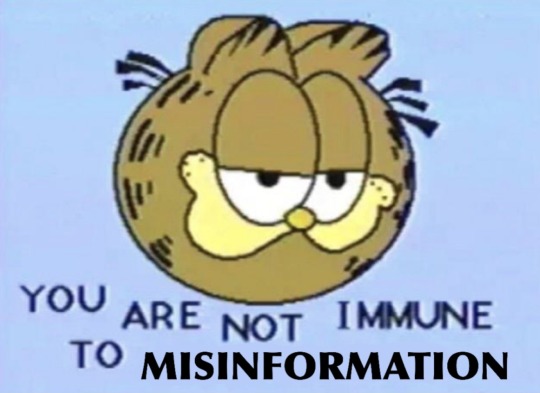
A few good sites/pages for learning some media literacy and spotting online misinformation:
Snopes.com - a site that’s been around for twenty years (long before Google search engine was a thing) debunking urban legands and, more recently, fake news and misinformation.
Checkyourfact.com - a site similar to snopes that debunks fake news and viral “facts”. It’s the place I found out that post about Kraft releasing a rainbow coloured mayo called “Real Gaydo” for pride month was a satirical photoshop piece that was stolen from its original artist’s Instagram and shared around as a real product on Facebook and other sites.
School Library Journal - has a page of resources for teaching students and teachers how to spot misinformation and fake news and improve media literacy.
NAMLE.net - aka the National Association for Media Literacy Education, the leading nonprofit membership organization dedicated to advancing media literacy education in the United States.
Newslit.org - an educational nonprofit that provides programs and resources for learning media literacy. What’s cool about this site is they have an extensive number of quizzes designed to help you test your media literacy skills, which give you tips along with the question answers about how to spot and avoid misinformation and fake news. All of which you can try out for yourself here.
If anyone has more good online literacy resources like this, please feel free to add more!
#resources#fake news#news literacy#media literacy#online literacy#snopes#check your fact#school library journal#namle#newslit#fact checking#misinfo#misinformation
510 notes
·
View notes
Text
Y'all know I just love collecting sideblogs, so the most recent one is here! I have a service learning project due soon and my chosen topic was news literacy.
It's @thisjustinofficial, and is a media and news literacy project dedicated to empowering individuals with the tools to critically analyze and evaluate the news they consume.
I'd really love it if y'all could go and support it and maybe help word get out about it!
#new blog#media literacy#news literacy#misinformation#malinformation#service learning project#disinformation#education
8 notes
·
View notes
Text
Spotting Inflammatory Language In Your News

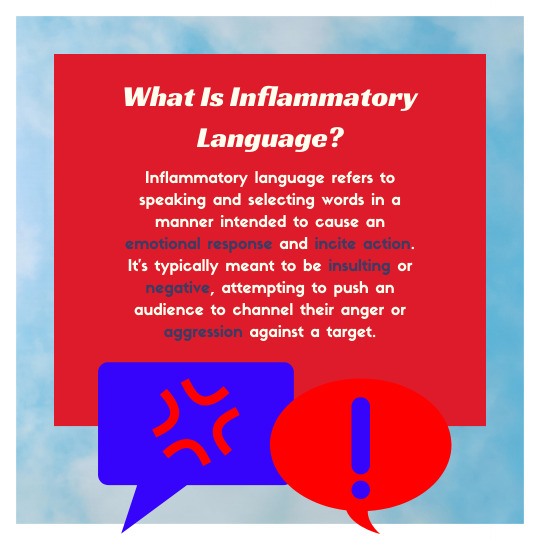

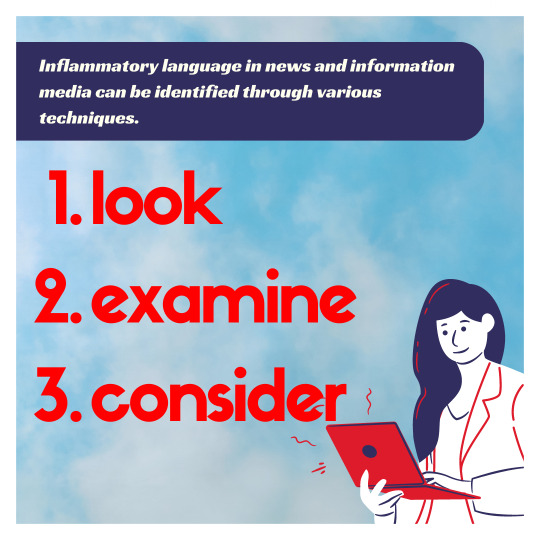

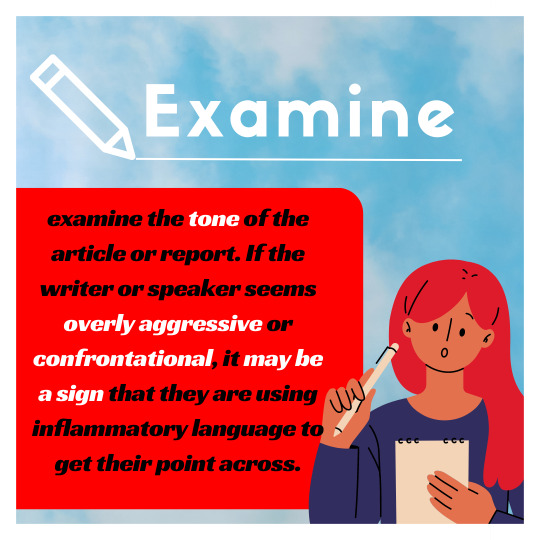
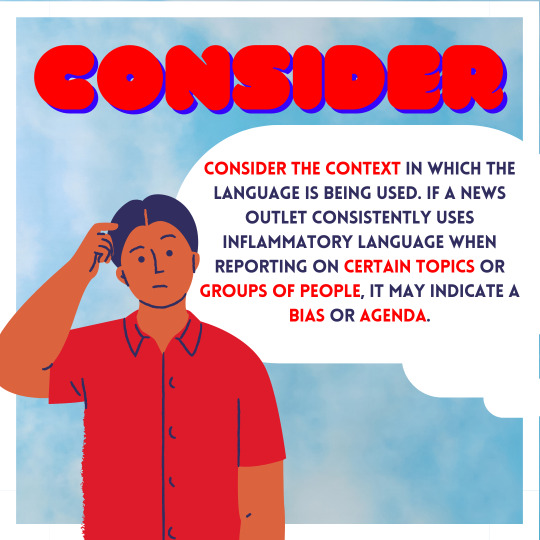
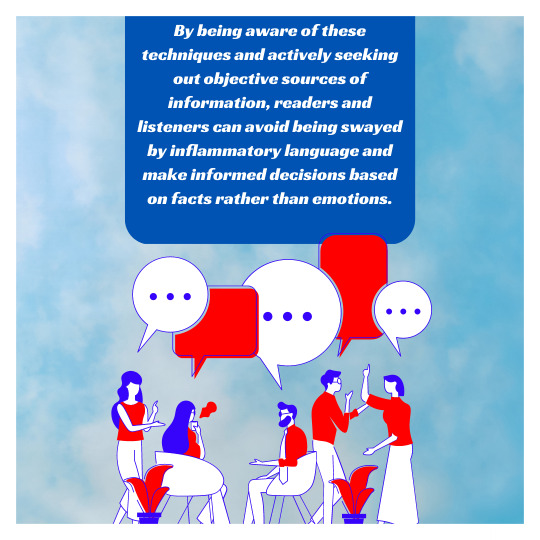

8 notes
·
View notes
Text
Blah preview, but this is a <5 min video about how to do "lateral reading" to validate a website you run across, to see if it's legit. I got this in an email from the News Literacy Project, which I recommend.
1 note
·
View note
Text
Something very imporant now more than ever,
This is the news literacy project, it helps teach people how to spot media disinformation and disinformation and I highly encourage everyone, no matter your age, to take a few mins and just check it out.
There's all sorts of helpful infographics to teach you, and it's definitely worth it.
1 note
·
View note
Text
Boas práticas na produção de conteúdos informativos: Um estudo do público jovem universitário
Escolha da temática da dissertação.
Inicialmente, o meu objetivo recaía na realização de um estágio de natureza profissional. Dada a impossibilidade desta modalidade, avancei para a escolha de uma temática a dissertar, tendo sido esta a minha primeira opção.
A paisagem mediática mudou significativamente com o avanço da tecnologia, afetando diretamente a forma como os jovens consomem informação. Integrando este público, considero do meu interesse compreender a importância do consumo de informações na sociedade contemporânea onde me insiro, cada vez mais caracterizada por um fluxo constante das mesmas.
Considerando este cenário, o acesso a conteúdos informativos é fundamental para a tomada de decisões informadas. É nesse contexto que destaco a importância de perceber o comportamento do público jovem, as suas preferências de consumo, plataformas e respetivos formatos / estrutura que o podem favorecer - questões que, com esta dissertação, pretendo abordar e responder.
Além disto, a compreensão das preferências dos jovens em relação ao consumo de informações pode ter implicações importantes tanto para a educação quanto para o jornalismo, incluindo a forma como as instituições educacionais e as organizações de notícias se podem adaptar para melhor atender a esse público. Através deste trabalho de investigação, pretendo obter insights valiosos que me permitam entender como é que essas adaptações podem ocorrer. Com base nos resultados deste estudo, terei a oportunidade de desenvolver e validar protótipos de conteúdos informativos, criados por mim, que atendam às necessidades específicas desse público - algo que captou, desde início, a minha atenção.
Por fim, outro fator que me conduziu à escolha desta opção prende-se com a crescente influência das redes sociais e como estas desempenham um papel importante na disseminação de informações, nomeadamente nos mais jovens. Desta forma, procuro compreender também como é que os algoritmos podem moldar o conteúdo consumido pelo público, condicionando-o.
Pergunta de investigação.
Que características tornam os conteúdos informativos mais apelativos ao público jovem universitário?
Título - 2 hipóteses.
Boas práticas na produção de conteúdos informativos: Um estudo do público jovem universitário;
Desenvolvimento de conteúdos informativos para públicos jovens: Desafios e recomendações.
Recursos bibliográficos.
Swart, J. (2023). Tactics of news literacy: How young people access, evaluate, and engage with news on social media. New Media & Society, 25(3), 505-521.
https://doi.org/10.1177/14614448211011447.
Selecionei este artigo porque analisa a dependência dos jovens nas redes sociais, explorando como os entrevistados acedem, avaliam e interagem com notícias nas plataformas. Salienta a necessidade de apostar na literacia de notícias e em programas de literacia midiática, fornecendo inputs que me parecem úteis.
Vázquez-Herrero, J., Negreira-Rey, M., & Sixto-García, J. (2022). Mind the Gap! Journalism on Social Media and News Consumption Among Young Audiences. International Journal of Communication, 16, 21.
https://ijoc.org/index.php/ijoc/article/view/19643.
Este artigo escreve, igualmente, sobre a importância das redes sociais na disseminação de informações para o público jovem. É relevante porque aborda a adoção de estratégias de integração dos veículos de notícias nas plataformas onde o público jovem é mais ativo digitalmente, de maneira a permanecerem relevantes.
Silveira, A. & Amaral, I. (2018). Young people and their practices of access and consumption of news in social media. Repositório da Universidade do Minho.
https://hdl.handle.net/1822/55063.
Este artigo indica que os mais jovens revelam apatia e desinteresse pelas questões “sérias” da sociedade e do mundo, tal como falta de motivação para acompanhar estes assuntos. Embora seja de maio de 2018, considero-o relevante para perceber melhor o panorama atual e o estudo que foi feito nesse sentido.
Martínez-Costa, M., Serrano-Puche, J., Portilla, I. & Sánchez-Blanco, C. (2019). Young adults’ interaction with online news and advertising. Comunicar, 27 (59), pp. 19-28.
https://doi.org/10.3916/C59-2019-02.
Considerei igualmente este artigo uma vez que retrata a forma como os jovens adultos interagem com as notícias e como esse consumo é afetado pela publicidade e compartilhamento de dados pessoais, condicionando esse acesso / consumo.
0 notes
Note
You say you aren't defending the nyt, but you are. A lot. They've pushed nazi shit in the past so OP has a right to be skeptical, especially with the racist caricature on the title
look i understand that you are probably very young but this is the most "how dare you say we piss on the poor" interpretation of my words.
you're talking about this post
tldr of this entirely too long response to a random anon:
no I didn't. improve your reading comprehension.
in the entirety of that post, all i said was "No. you can't judge articles based on the title alone".
What i did i say but the tldr version:
1. this wasn't written by a journalist, it doesn't allow you to make judgment calls of the publications news articles.
2. article titles are clickbait. they are meant to get your attention they are not meant to inform you.
please compare, and consider what brings in more clicks(=money):
actual title: Opinion | Why Are Some Cultures More Individualistic Than Others?
clickbait: Wheat People vs. Rice People
I never said they weren't allowed to be sceptical. It's good to be sceptical. I actually said: "If you haven't read the article don't make a post insinuating this professor actually wrote a piece on race science" I'll be frank, if you don't even bother reading the article, shut up. avoiding the nyt paywall is only one google search away.
beemovieeroticas and my point literally spelt out as crystal clear as i can: the way op interacts with news media be it actual news articles or opinion pieces shows a clear lack of ability to determine the credibility of news and other information and to recognize the standards of fact-based journalism to know what to trust, share and act on.
opinion pieces are only ever worth as much as the author who wrote them, who you'll have to look up yourself, and the quality of their sources, which, you guessed it, you'll have to look up yourself. Being sceptical is literally the right step here, but op wasn't sceptical, they jumped to conclusions. if you read opinion pieces treat it like you asked a random stranger their opinion on the topic of the piece.
Also, as a side note, the study literally wasn't even the point of the piece. The entire point of the piece is how destructive us-american hyperindividualism is and how we should actually care about one another and not only view ourselves as a lone, independent person who needs no one besides ourselves. That is the actual point of the piece btw.
0 notes
Text
I love how on Tumblr, "media literacy" has become "Um, just because someone writes about this doesn't mean they're endorsing this. I hate all these media puritans ruining everything."
I'm sad to inform you that knowing when and whether an author is endorsing something, implying something, saying something, is also part of media literacy. Knowing when they are doing this and when they're not is part of media literacy. Assuming that no author has ever endorsed a bad thing is how you fall for proper gander. It's not media literacy to always assume that nobody ever has agreed with the morally reprehensible ideas in their work.
Sometimes, authors are endorsing something, and you need to be aware when that happens, and you also need to be aware when you're doing it as an author. All media isn't horny dubcon fanfic where you and the author know it's problematic IRL but you get off to it in the privacy of your brain. Sometimes very smart people can convince you of something that'll hurt others in the real world. Sometimes very dumb people will romanticize something without realizing they're doing it and you'll be caught up in it without realizing that you are.
Being aware of this is also media literacy. Being aware of the narrative tools used to affect your thinking is media literacy. Deciding on your own whether you agree with an author or not is media literacy. Enjoying characters doing bad things and allowing authors to create flawed or cruel characters for the sake of a story is perfectly fine, but it is not the same as being media literate. Being smug about how you never think an author has bad intentions tells me you're edgy, not that you're media literate. You can't use one rule to apply to all media. That's not how media literacy works. Sorry! Sorry! Sorry! Aheem heem. Anyway.
#anyway this is just more of that lefty shit where 'well i can't be racist because i'm gay!'#'well i can't be media illiterate because i love villains!'#not how that works babes#'well I KNOW bad from good so i can't be affected by media!'#'everyone else also knows bad from good and defines it the exact way i do!'#'so if i think this is bad then the author must also think this is bad!'#i have bad news ....#also how do you know bad from good? who taught you that? hmm?#did you fall out of the womb knowing? or did you pick up some things on the way here?#'i just know' no you don't! that's what i'm saying!#assuming one thing is always true is the opposite of being a conscious consumer of media soz#assuming someone thinks and knows the exact same shit you think and know is not media literacy!!
14K notes
·
View notes
Text
like, genuinely.
any time someone tells you something: a news headline, a news article, a politician or ceo speaking, anyone wanting to sell you something, anyone wanting to convince you of something, anyone making assertions in an argument, whatever. you have to ask yourself two things.
what are they actually claiming when they say that?
what do they get out of you believing it? what do they get out of being able to make this claim? how does it make them more money?
1 note
·
View note
Text
the idea that reading is 'supposed to be' some kind of unenjoyable gruelling intellectual penance is also so goofy because like, good fucking luck disciplining yrself into cultivating a habit you hate and that makes you miserable i guess! it's like if you insisted people's food should be bland or unpalatable in the name of Health and anyone who ate something tasty was morally inferior and a societal danger. oh wait
7K notes
·
View notes
Text
A media literacy handbook for Israel-Gaza

Next Tuesday (Oct 31) at 10hPT, the Internet Archive is livestreaming my presentation on my recent book, The Internet Con.

Media explainers are a cheap way to become an instant expert on everything from billionaire submarine excursions to hellaciously complex geopolitical conflicts, but On The Media's "Breaking News Consumers' Handbooks" are explainers that help you understand other explainers:
https://www.wnycstudios.org/podcasts/otm/segments/breaking-news-consumers-handbook-israel-and-gaza-edition-on-the-media
The latest handbook is an Israel-Gaza edition. It doesn't aim to parse fine distinctions over the definition of "occupation" or identify the source of shell fragments. Rather, it offers seven bullet points' worth of advice on weighing all the other news you hear about the war:
https://media.wnyc.org/media/resources/2023/Oct/27/BNCH_ISRAEL_GAZA_EDITION_1.pdf
I. "Headlines are obscured by the fog of war"
Headline writers have a hard job under the best of circumstances – trying to snag your interest in a few words. Headlines can't encompass all the nuance of a story, and they are often written by editors, not the writers who produced the story. Between the imperatives for speed and brevity and the broken telephone between editors and writers, it's easy for headlines to go wrong, even when no one is attempting to mislead you. Even reliable outlets will screw up headlines sometimes – and that likelihood goes way up in times like these. You gotta read the story, not just the headline.
II. Know red flags for bullshit
The factually untrue information that spreads furthest tends to originate with a handful of superspreader accounts. Whether these people are Just Wrong or malicious disinfo peddlers, they share a few characteristics that should trip your BS meter and prompt extra scrutiny:
High-frequency posting
Emotionally charged framing
Posts that purport to be summaries or excerpts from news outlets, but do not include links to the original
The phrase "breaking news" (no one has that many scoops)
III. Don't trust screenshots
Screenshots of news stories, tweets, and other social media should come with links to the original. It's just too damned easy to fake a screenshot.
IV. "Know your platform"
It used to be that Twitter got a lot of first-person accounts from people in the thick of crises, while Facebook and Reddit contained commentary and reposts. Today, Twitter is just another aggregator. This time around, there's lots of first-person, real-time reporting coming off Telegram (it runs well on old phones and doesn't chew up batteries). Instagram is widely used in both Israel and the West Bank.
V. "Crisis actors" aren't a thing
People who attribute war images to "crisis actors" are either deluded or lying. There's plenty of ways to distort war news, but paying people to pretend to be grieving family members is essentially unheard of. Any explanation that involves crisis actors is a solid reason to permanently block that source.
VI. There's plenty of ways to verify stuff that smells fishy
TinEye, Yandex and Google Image Search are all good tools for checking "breaking" images and seeing if they're old copypasta ganked from earlier conflicts (or, you know, video-games). The fact that an image doesn't show up in one of these searches doesn't guarantee its authenticity, of course.
VII. Think before you post
Israel-Gaza is the most polluted media pool yet. Don't make it worse.
There's plenty more detail on this (especially on the use of verification tools) in Brooke Gladstone's radio segment:
https://www.wnycstudios.org/podcasts/otm/episodes/on-the-media-breaking-news-consumers-handbook-israel-gaza-edition
The media environment sucks, and warrants skepticism and caution. But we also need to be skeptical of skepticism itself! As danah boyd started saying all the way back in 2018, weaponized media literacy leads to conspiratorialism:
https://www.zephoria.org/thoughts/archives/2018/03/09/you-think-you-want-media-literacy-do-you.html
Remember, the biggest peddlers of "fake news" are also the most prolific users of the term. For a lot of these information warriors, the point isn't to get you to believe them – they'll settle for you believing nothing. "Flood the zone with bullshit" is Steve Bannon's go-to tactic, and it's one that his acolytes have picked up and multiplied.
It's important to be a critical thinker, but there's plenty of people who've figured out how to weaponize a critical viewpoint and turn it into nihilism. Remember, the guy who wrote How To Lie With Statistics was a tobacco industry shill who made his living obfuscating the link between smoking and cancer. It's absolutely possible to lie with statistics, but it's also possible to use statistics to know the truth, as Tim Harford explains in his 2021 must-read book The Data Detective:
https://pluralistic.net/2021/01/04/how-to-truth/#harford
There's a world of difference between being misled and being brainwashed. A lot of today's worry about "disinformation" and "misinformation" has the whiff of a moral panic:
https://www.nakedcapitalism.com/2023/10/are-we-having-a-moral-panic-over-misinformation.html
It's possible to have a nuanced view of this subject – to take steps to enure you're not being tricked without equating crude tricks like sticking a fake BBC chyron on a 10-year-old image with unstoppable mind-control:
https://sts-news.medium.com/youre-doing-it-wrong-notes-on-criticism-and-technology-hype-18b08b4307e5

If you'd like an essay-formatted version of this post to read or share, here's a link to it on pluralistic.net, my surveillance-free, ad-free, tracker-free blog:
https://pluralistic.net/2023/10/28/fog-o-war/#breaking-news
#pluralistic#media literacy#fake news#disinformation#misinformation#israel gaza#gaza#israel#palestine#conspiratorialism#hoaxes#infowar#on the media#breaking news#npr#flood the zone
2K notes
·
View notes
Text
Bias? In Your News? (It's More Likely Than You Think)
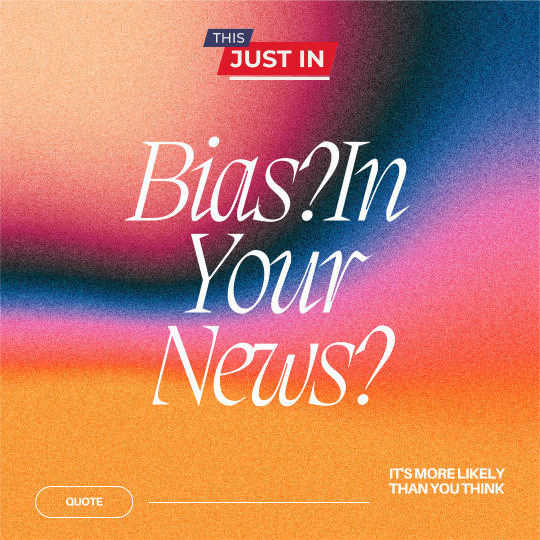
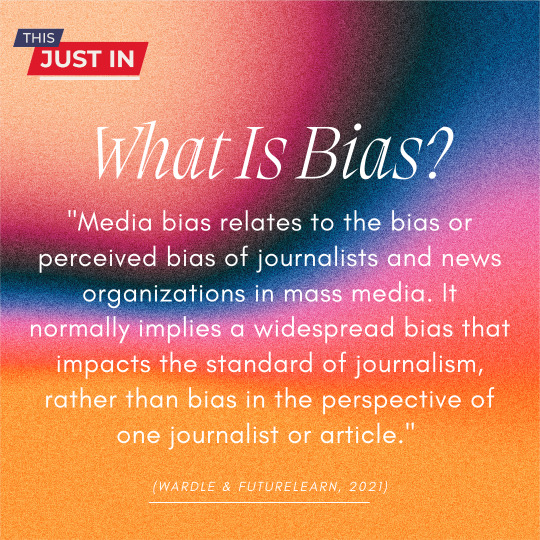

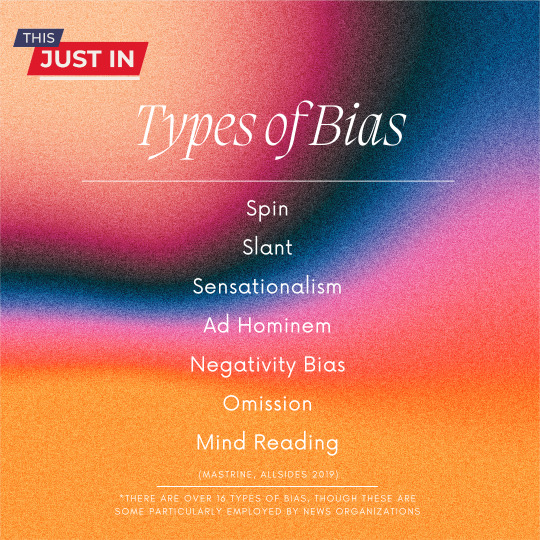
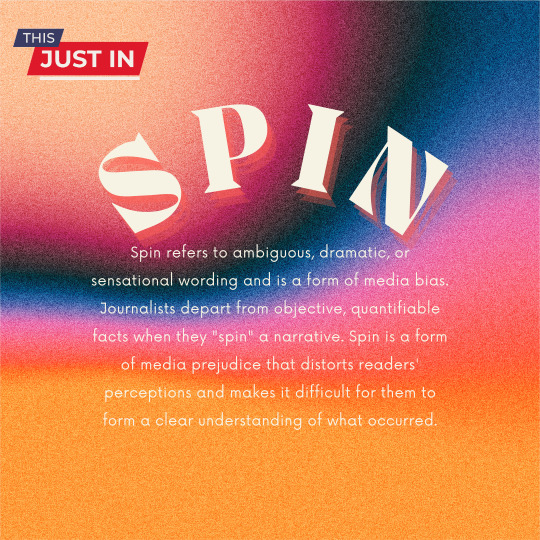


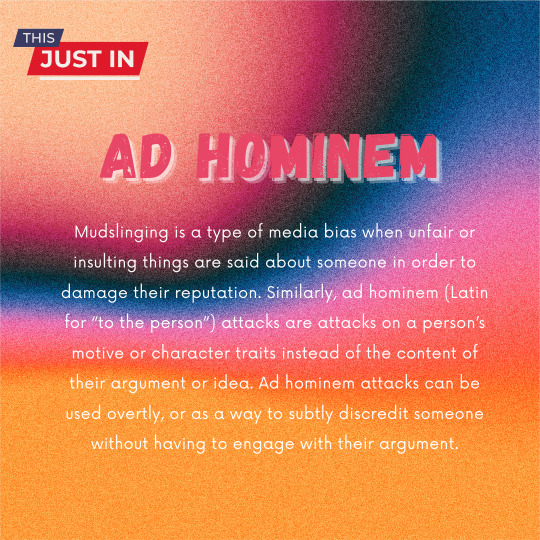

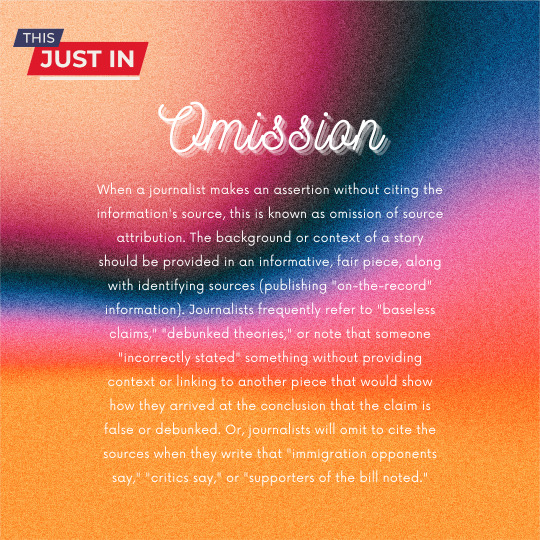


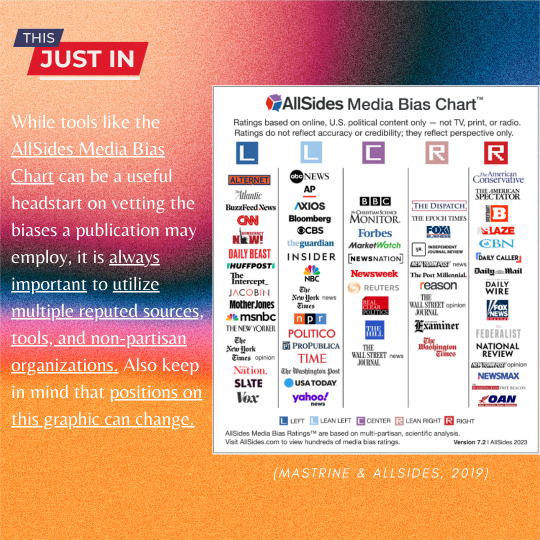
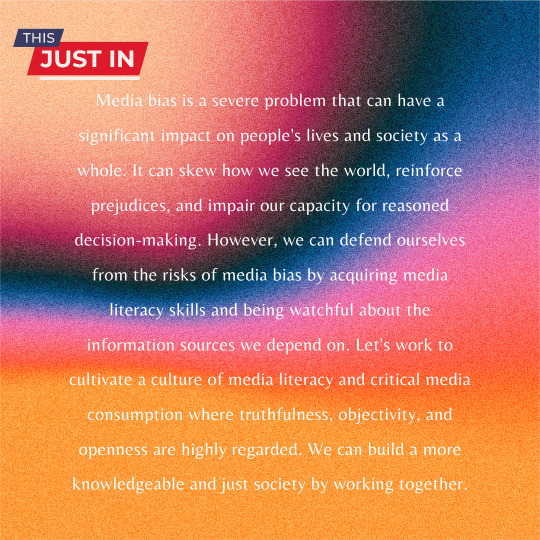

6 notes
·
View notes
Text
From the article:
Should we worry, as massive book-banning efforts imply, that young people will be harmed by certain kinds of books? For over a decade and through hundreds of interviews, my colleague, literacy professor Peter Johnston, and I have studied how adolescents experience reading when they have unfettered access to young adult literature. Our findings suggest that many are helped rather than harmed by such reading.
For one study, we spent a year in a public middle school in a small, mid-Atlantic town, observing and talking to eighth grade students whose teachers, rather than assigning the “classics” or traditional academic texts, let students choose what to read and gave them time to read daily in class. To support student engagement, they made available hundreds of contemporary books that are relevant to the students’ lives. The books included many of the titles currently being challenged, according to PEN America, which is a nonprofit that advocates against censorship, among other things. The titles include Ellen Hopkins’ “Identical,” Jay Asher’s “Thirteen Reasons Why,” Patricia McCormick’s “Sold,” and others that were banned because of themes of sex and violence.
We were interested in what the students perceived to be the consequences of reading young adult literature. They tended to read books they described as “disturbing.” At the end of the school year, we interviewed 71 of the students about changes in their reading and relationships with peers and family.
We also asked open-ended questions about how, if at all, they had changed as people since the beginning of the year. Beyond reading substantially more than they had previously, they reported positive changes in their social, emotional and intellectual lives that they attributed to reading, the kinds of books they read and the conversations those books provoked.
Here are six ways students told us they had been changed by reading and talking about edgy young adult books.
670 notes
·
View notes
Text
honestly i hate how that “maybe the curtains are just blue” post has become shorthand for anti-intellectualism and shit bc as someone who has an utter passion for media analysis now, I WAS THAT PERSON IN HIGH SCHOOL ENGLISH CLASS.
english class never taught me how to analyze stories, it taught me how to remember what things the teacher said were “symbolism” and how to take quizzes where we had to match a quote to the character who said it. i didn’t give a shit about any of it, bc literally why should i. it was bullshit.
there’s this idea online that people are forgetting or rejecting what they learned in english class when they’re bad at media analysis, and maybe that’s a little bit true, but i think the much bigger problem is they never learned it in the first place. cinemasins & “maybe the curtains are just blue” aren’t convincing people to abandon an intellectualism they already had, they’re filling a void.
when all you learn in high school is to write on the test “blue = depression”, why is it surprising that so many people don’t give a shit about the curtains.
#media analysis#i literally didn’t care about criticism until i started watching video essays in 2017#and they taught me that u could actually do interesting things with analysis#and i cannot fucking stand this shit that pretends people should all know better#also it’s not new; people who act like media literacy is getting worse are so fucking funny like#have u met an adult. have u spoken to say. an adult family member#ever in ur life#ur just on the internet now. ur seeing a million bad takes that used to be reserved for in-person conversations#or maybe writing into a paper or magazine#get real#get fucking real#1k
1K notes
·
View notes